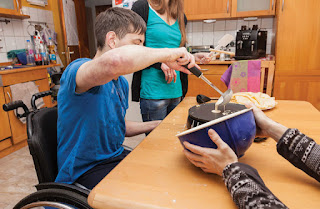Personal Care Assistants for Seniors: A Guide to Finding the Best Care
As our loved ones age, they often require extra care and support to maintain their quality of life. Personal care assistants (PCAs) can be a vital resource for seniors, assisting with daily activities and ensuring their well-being. Remember that selecting the suitable PCA can significantly enhance your loved one's quality of life and overall well-being.
Suppose you're seeking a personal care assistant in Massachusetts or are interested in the personal care attendant program in Massachusetts. In that case, this comprehensive guide will delve deeper into the process of finding the best care for your senior family members.
Understanding the Role of Personal Care Assistants (PCAs)
Before we delve into the details of finding the right personal care assistant, let's further explore the essential role that PCAs play in the lives of seniors and individuals with disabilities.
● Assistance with Daily Activities:
PCAs assist with essential daily tasks, including bathing, dressing, grooming, and toileting. These services ensure that seniors maintain personal hygiene and dignity.
● Mobility Support:
For seniors with limited mobility, PCAs provide crucial support. They help with walking, transferring between the bed and chair, and using mobility aids like wheelchairs or walkers.
● Medication Reminders:
Seniors often have complex medication regimens. PCAs help seniors adhere to their treatment plans by providing medication reminders.
● Meal Preparation and Nutrition:
Ensuring that seniors receive proper nutrition is crucial for their overall health. PCAs help plan and prepare balanced meals, taking dietary restrictions and preferences into account.
● Companionship:
Loneliness and isolation can significantly affect seniors' well-being. PCAs provide companionship by engaging in conversation, playing games, or accompanying seniors on outings.
● Household Assistance:
Some PCAs may assist with light housekeeping tasks, such as tidying up, laundry, and grocery shopping, to ensure a safe and comfortable living environment.
● The Importance of Choosing the Right Personal Care
Assistant (PCA)
Selecting the right personal care assistant is a critical
decision that can significantly impact your loved one's well-being. Let's
explore the essential steps to help you make an informed choice.
- Assessing Your
Loved One's Needs:
Before you begin your search for a personal care assistant, conduct a thorough assessment of your loved one's specific needs. Take the following into consideration:
● Daily Activities: Identify
which daily tasks your loved one requires assistance with, such as bathing,
dressing, or meal preparation.
● Medical Requirements: Determine if your loved one has specific medical needs, such as medication management or mobility assistance.
● Companionship: Assess the importance of companionship and social interaction for your loved one's emotional well-being.
2.
Establishing Your
Budget:
Determine a budget for a personal care assistance program
in Massachusetts. Consider how much you can comfortably afford to spend on
these services. Be aware that some financial assistance programs may be
available in Massachusetts to help cover the costs.
- Seeking
Recommendations:
Reach out to friends, family, and healthcare professionals
for recommendations. They may have insights into reputable personal care
assistants in Massachusetts based on their experiences.
- Researching
Agencies:
Consider working with a reputable home care agency. These
agencies often have a pool of trained PCAs, conduct thorough background checks,
and provide backup care when needed, ensuring continuous support.
- Conducting
Interviews:
Whether you choose an independent PCA or work with an agency, conducting interviews is essential. Here's what to focus on during the interview process:
● Experience and Qualifications: Ask about their experience, certifications, and training in caregiving.
● Approach to Care: Inquire about their caregiving philosophy and how they tailor their services to individual needs.
● Availability: Discuss scheduling and ensure their availability aligns with your loved one's requirements.
6.
Checking References:
Request references from potential PCAs or agencies.
Speaking with previous clients can provide valuable insights into the quality
of care provided and the PCA's professionalism.
- Clarifying
Expectations:
Clearly communicate your expectations regarding the role of
the PCA. Discuss schedules, duties, and specific care instructions for your
loved one.
- Ensuring Compatibility:
It's essential that your loved one feels comfortable with
their PCA. Compatibility in personality and communication style can
significantly enhance the caregiving experience.
- Monitoring and
Communication:
Once care begins, maintain open communication with the PCA.
Regularly check in on your loved one to ensure their needs are being met and
that both parties are comfortable with the arrangement.
- Staying
Informed about State Programs:
If you plan to use state-funded services, familiarize yourself with Massachusetts's personal care attendant program. Understanding the program's guidelines, eligibility criteria, and application process is crucial to accessing support.
Conclusion
Finding the best personal care assistant for your senior loved one in Massachusetts involves carefully planning and considering their unique needs. By assessing these needs, conducting thorough research, and maintaining open communication, you can ensure your loved one receives the compassionate care and support they deserve.
If you seek reliable and compassionate personal care
assistant services in Massachusetts, consider contacting the NortheastIndependent Living Program (NILP). They understand the importance of
personalized care and are dedicated to improving the lives of seniors and
individuals with disabilities. Contact NILP today to discuss your loved one's
specific needs and how we can support them.


Comments
Post a Comment